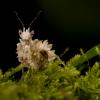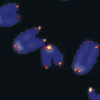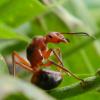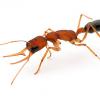Because we do care about them. I think I speak for everyone in saying that we don't capture queens ants for amusement, but rather for understanding. Understanding that ants are amazing creatures, with complex social systems, that we could never create ourselves. We take them into captivity to protect them (especially here in the South) from fire and argentine ants, that would surely kill the wonderful native ants that we love. We take them into captivity to give them a better chance of survival. In the wild 1 queen ant in about 100 will make it to maturity, and even then it's even more rare for them to last 5+ years. So I think it's pretty ignorant to say we don't care about ants.
What? Then what? We understand, and then? How are you contributing to the increase in their global population? Are you going to keep them until the queens die of old age or will you release them? If you do release them, when will you release them? Perhaps, will they die from stress? How are they going to mate in captivity? Now, I've done a bit of reading on mating in captivity, and it seems like the odds are low. Also, from what I've read, and from what I've experienced, many queens that may have survived in the wild, died due to captivity in relation to stress or environmental factors including, but not limited to drowning, overheating, physical trauma, etc. Let's cut the crap, we love ants, but "most" of us haven't helped with the problem, and as a matter of a fact, made it worse. Yeah, I remember my share of killing a few queens due to human error; queens that could have survived in the wild, who knows. The odds of queens surviving in the wild is low, but that one tough queen could have flourished and expanded, if it hadn't been for us.
https://www.formicul...ale-california/
4 x Solenopsis xyloni (Fire ant) colonies.
2 x Veromessor andrei (Seed-harvester ant) colonies.
19 x Pogonomyrmex subnitidus (Seed-harvester ant) colonies + 3 x Pogonomyrmex (ID uncertain) colonies
16 x Linepithema humile (Argentine ant) colonies.
1 x Unknown Formicidae colony.
1 x Tapinoma sessile (Odorous house ant) colony.
1 x Camponotus fragilis (Carpenter/wood ant) colony + 1 x Camponotus sansabeanus (Carpenter/wood ant) colony.
1 x Solenopsis molesta (Thief ant) colony.





















